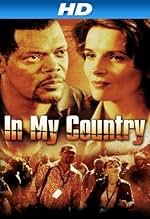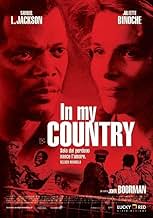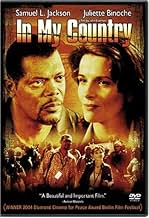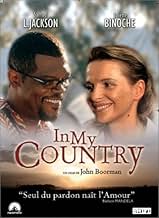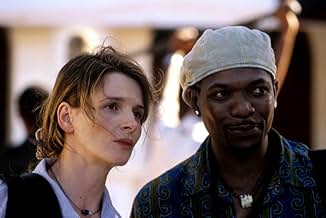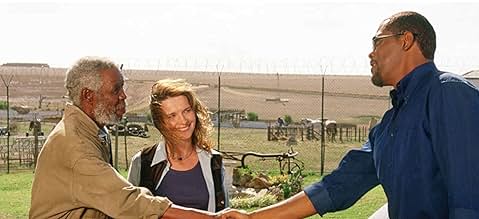A journalist and a poetess meet during the hearings of South African Truth and Reconciliation Commission.A journalist and a poetess meet during the hearings of South African Truth and Reconciliation Commission.A journalist and a poetess meet during the hearings of South African Truth and Reconciliation Commission.
- Director
- Writers
- Stars
- Awards
- 1 win & 3 nominations total
Menzi Ngubane
- Dumi Mkhalipi
- (as Menzi 'Ngubs' Ngubane)
Harriet Lenabe
- Albertina Sobandla
- (as Harriet Manamela)
Dan Robbertse
- Sgt. de Smidt
- (as Daniel Robbertse)
- Director
- Writers
- All cast & crew
- Production, box office & more at IMDbPro
Featured reviews
Watching any one of the three - Juliette Binoche, Samuel L. Jackson, Brendan Gleeson - painting a wall would be a good use of time. Seeing them all in the same movie is a rare treat.
Jackson (Pulp Fiction) is Langston Whitfield from the Washington Post, sent to monitor the Truth and Reconciliation Commission hearings in South Africa. To avoid bloodshed, the commission asked white Afrikaners to appear before a public tribunal, confess exactly what they did, convince the commission they were acting under orders, make a believable apology, and amnesty will be given.
Bonoche (The English Patient, Chocolat)is Anna Malan, a poet, who is doing daily broadcasts for the South African Broadcasting Company.
Gleeson (In Bruges, Into the Storm, The Guard) is De Jager, a a South African cop with a zeal for torture and murder that went far beyond his job requirements; a reputed psychopath that is taking the fall for all the other criminals his superiors, in a new South Africa.
Anna finds out things she really didn't want to know, and Whitfield finds that truth is not so black and white, as he believed.
Jackson (Pulp Fiction) is Langston Whitfield from the Washington Post, sent to monitor the Truth and Reconciliation Commission hearings in South Africa. To avoid bloodshed, the commission asked white Afrikaners to appear before a public tribunal, confess exactly what they did, convince the commission they were acting under orders, make a believable apology, and amnesty will be given.
Bonoche (The English Patient, Chocolat)is Anna Malan, a poet, who is doing daily broadcasts for the South African Broadcasting Company.
Gleeson (In Bruges, Into the Storm, The Guard) is De Jager, a a South African cop with a zeal for torture and murder that went far beyond his job requirements; a reputed psychopath that is taking the fall for all the other criminals his superiors, in a new South Africa.
Anna finds out things she really didn't want to know, and Whitfield finds that truth is not so black and white, as he believed.
COUNTRY OF MY SKULL aka IN MY COUNTRY is no masterpiece thats for sure, but it has been unfairly slaughtered by critics who were expecting something else entirely.
The film is set against the real life "Truth and Reconcilliation Commission" set up in South Africa after apartheid in order to begin the process of healing the wounds of a divided nation.
However this commission is not the subject of the film, it is the setting. The main drama of the film emanates from the love/hate relationship between journalists Langston Whitfield (Samuel L.Jackson) and Anna Malan (Juliette Binoche).
Whitfield, a Washington Post journalist, is sent to South Africa to cover the hearings. He meets local journalist Anna Malan who is covering the hearings for radio. She trusts the commission entirely and believes forgiveness is the only way forward for her country.
Whitfield however places no trust in a system that does not punish. The pair immediately clash and begin a battle of wills.
however soon the enormity of the evidence they hear draws them together into an affair.
Boorman is not interested in exploring the TRC as a system or it's successes and failures. Instead he is more interested in its impact on his two vastly different protagonists, who must confront issues of race and gender in their own relationship as much as in their work. This is the films strength and weakness. It is beautifully intimate yet is set in a time of great social upheaval which is all but ignored.
The other major problem is that much of the early dialogue sets out to explain the political and social setting rather than define the characters. This leads to somewhat inane characterisation.
With Binoche however Boorman has struck it lucky. Her hard work is evident and although her character is poorly drawn the actresses understanding of emotion allows us to read much into her performance. Even her Afrikaans accent is passable. She displays an incredible tenderness throughout the film. Jackson however does not fair as well, giving a sullen and almost lethargic performance.
To call COUNTRY OF MY SKULL an utter failure as has been suggested by some critics is unfair. With his female protagonist and interesting setting Boorman's sincerity is beyond question and for that alone he deserves praise.
The film is set against the real life "Truth and Reconcilliation Commission" set up in South Africa after apartheid in order to begin the process of healing the wounds of a divided nation.
However this commission is not the subject of the film, it is the setting. The main drama of the film emanates from the love/hate relationship between journalists Langston Whitfield (Samuel L.Jackson) and Anna Malan (Juliette Binoche).
Whitfield, a Washington Post journalist, is sent to South Africa to cover the hearings. He meets local journalist Anna Malan who is covering the hearings for radio. She trusts the commission entirely and believes forgiveness is the only way forward for her country.
Whitfield however places no trust in a system that does not punish. The pair immediately clash and begin a battle of wills.
however soon the enormity of the evidence they hear draws them together into an affair.
Boorman is not interested in exploring the TRC as a system or it's successes and failures. Instead he is more interested in its impact on his two vastly different protagonists, who must confront issues of race and gender in their own relationship as much as in their work. This is the films strength and weakness. It is beautifully intimate yet is set in a time of great social upheaval which is all but ignored.
The other major problem is that much of the early dialogue sets out to explain the political and social setting rather than define the characters. This leads to somewhat inane characterisation.
With Binoche however Boorman has struck it lucky. Her hard work is evident and although her character is poorly drawn the actresses understanding of emotion allows us to read much into her performance. Even her Afrikaans accent is passable. She displays an incredible tenderness throughout the film. Jackson however does not fair as well, giving a sullen and almost lethargic performance.
To call COUNTRY OF MY SKULL an utter failure as has been suggested by some critics is unfair. With his female protagonist and interesting setting Boorman's sincerity is beyond question and for that alone he deserves praise.
I thought this movie did very well in exploring many different relationships and story lines. Above all, this movie asked all of the hard questions and brought into light a lot of truth that a lot of people don't like to look at.
The African sense of justice is about reconciliation, not revenge. By using the testimonials of several individuals, this movie was very educational. The healing that was allowed to happen within the process of reconciliation was very inspirational. Their sophisticated system made a lot of sense to me, and seems much more advanced than systems employed where i live in the US.
The relationship between Langston and Anna brought a political story to a personal level. It was beautiful to see Anna come to terms with her own sense of responsibility, being a white south African who had known of the atrocities, but had done nothing to stop them. Langston forced her to examine her position, but was also there to support her when she felt crushed by the enormity. Their acting was very convincing and skillful. I especially loved the scene where Anna attacked Langston, but thought the actual sex scene could have been more believable.
One character I haven't seen anyone comment on is Anna'a assistant, Dumi. This character brought the story to yet another level. He was the classic joker with hidden depths. His character communicated to the audience that nothing is black or white; nothing is simple; really it's all endlessly complex.
In fact, this story was anything but one-sided. It showed many masks that individuals wear in specific situations. It communicated so much about humanity, both as individuals and as members of a larger society. I find it quite relevant to my experience as a white American who knows my government is responsible for the suffering of multitudes at this moment in time, and I feel responsible and helpless at the same time.
A man who sat behind me in the theater kept telling his girlfriend he wanted to leave because it was unpleasant. Yes, it is unpleasant, if you're the type of person who doesn't like to look at reality. But what I cam away with from the movie was a feeling of awe about humanity's capacity for compassion.
The African sense of justice is about reconciliation, not revenge. By using the testimonials of several individuals, this movie was very educational. The healing that was allowed to happen within the process of reconciliation was very inspirational. Their sophisticated system made a lot of sense to me, and seems much more advanced than systems employed where i live in the US.
The relationship between Langston and Anna brought a political story to a personal level. It was beautiful to see Anna come to terms with her own sense of responsibility, being a white south African who had known of the atrocities, but had done nothing to stop them. Langston forced her to examine her position, but was also there to support her when she felt crushed by the enormity. Their acting was very convincing and skillful. I especially loved the scene where Anna attacked Langston, but thought the actual sex scene could have been more believable.
One character I haven't seen anyone comment on is Anna'a assistant, Dumi. This character brought the story to yet another level. He was the classic joker with hidden depths. His character communicated to the audience that nothing is black or white; nothing is simple; really it's all endlessly complex.
In fact, this story was anything but one-sided. It showed many masks that individuals wear in specific situations. It communicated so much about humanity, both as individuals and as members of a larger society. I find it quite relevant to my experience as a white American who knows my government is responsible for the suffering of multitudes at this moment in time, and I feel responsible and helpless at the same time.
A man who sat behind me in the theater kept telling his girlfriend he wanted to leave because it was unpleasant. Yes, it is unpleasant, if you're the type of person who doesn't like to look at reality. But what I cam away with from the movie was a feeling of awe about humanity's capacity for compassion.
Director John Boorman has taken on a weighty and incendiary subject, much like Terry George's recent take on genocide in "Hotel Rwanda." Although "In My Country" is set post-Apartheid, it still covers a hot topic: what do you do with the people that are to blame when a genocide occurs? President Nelson Mandela formed a commission to get at the truth and in return for that information he was offering amnesty for those government officers that were only 'following orders'. An amazing precedent to say the least.
However, director Boorman has chosen to balance the emotional testimony of the victims with a sometimes humorous side-story involving an American journalist, played by the great Samuel L. Jackson ("Coach Carter") and a local 'white' radio reporter, played by the equally great Juliette Binoche ("The English Patient").
Certainly, a story of this import deserves a documentary but as it stands, this is as close as any American will ever get to this story since many newspapers buried it when it originally occurred. Racism is an ugly thing, but forgiveness is a beautiful thing and this movie balances the two in an effective and entertaining manner.
Check this one out, especially if you are a fan of "Hotel Rwanda" and hearing the 'truth' for a change.
However, director Boorman has chosen to balance the emotional testimony of the victims with a sometimes humorous side-story involving an American journalist, played by the great Samuel L. Jackson ("Coach Carter") and a local 'white' radio reporter, played by the equally great Juliette Binoche ("The English Patient").
Certainly, a story of this import deserves a documentary but as it stands, this is as close as any American will ever get to this story since many newspapers buried it when it originally occurred. Racism is an ugly thing, but forgiveness is a beautiful thing and this movie balances the two in an effective and entertaining manner.
Check this one out, especially if you are a fan of "Hotel Rwanda" and hearing the 'truth' for a change.
A black journalist of Washington Post, Langton Whitfield; is sent by provocation by his boss to South Africa in order to "cover" the auditions of proceedings named Truth and Reconciliation Commission, that must decide if murders and torture authors can be amnestied if they say truth on act that they have made and express regrets in face of their victims. Langston encounters a young Afrikaner woman who follows also for South African radio the same sessions. She discovers the horror of Apartheid politics and she is bowled over by these facts. In these circumstances, Langston and Anna bring closer together. It is the story of the deep of human cruelty and also of the power of love and forgetting. The movie is dramatic and well played by Samuel L. Jackson and Juliette Binoche, but seems to be a little too oriented and melodramatic.
Did you know
- TriviaAfter seeing this film Nelson Mandela called it, "a beautiful and important film about South Africa's Truth and Reconciliation Commission. It will engage and influence not only South Africans, but people all over the world concerned with the great questions of human reconciliation, forgiveness, and tolerance."
- GoofsAll number plates on vehicles throughout the film (apart from archival footage) are fake and do not follow the format of older South African number plates.
- Quotes
Anna Malan: [last lines - voiceover] Because of you, this land no longer lies between us but within. It breathes becalmed, after being wounded in its wondrous throat. In the cradle of my skulll it sings, it ignites my tongue. Five thousand stories are scorched on your skin. I am changed forever.. I want to say, forgive me, forgive me, forgive me.
- ConnectionsEdited into In My Country: Deleted Scenes (2005)
- SoundtracksSenzenina
Arranged by Murray Anderson & Warrick Swinney
Performed by Princess Soi-Soi Gqeza, Mxolisi Mayekane, Mandia Lande, Michael Ludonga, Simpiwe Matole & The New Teenage Gospel Choir
Published by Hi-Z Sound
- How long is In My Country?Powered by Alexa
Details
- Release date
- Countries of origin
- Official sites
- Languages
- Also known as
- Country of My Skull
- Filming locations
- Production companies
- See more company credits at IMDbPro
Box office
- Budget
- $12,000,000 (estimated)
- Gross US & Canada
- $163,893
- Opening weekend US & Canada
- $22,383
- Mar 13, 2005
- Gross worldwide
- $1,491,434
- Runtime
- 1h 45m(105 min)
- Color
- Sound mix
- Aspect ratio
- 1.85 : 1
Contribute to this page
Suggest an edit or add missing content


